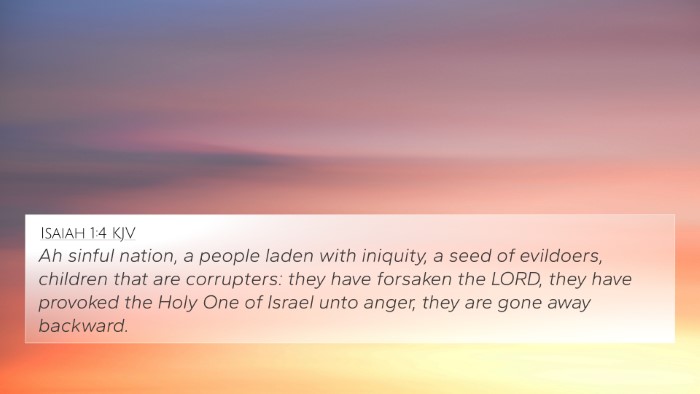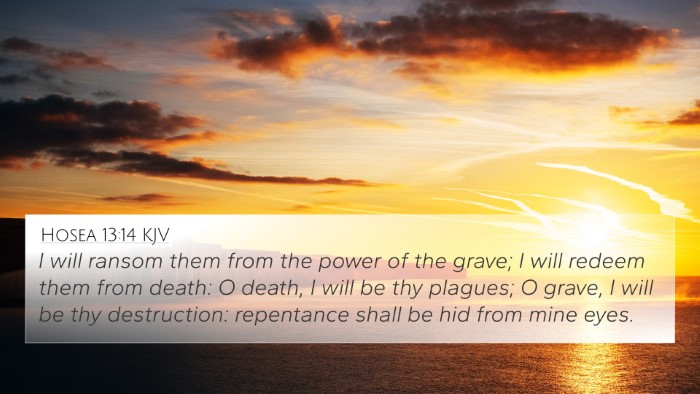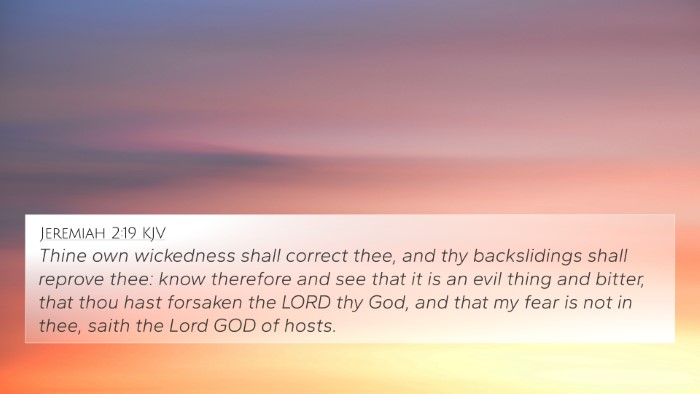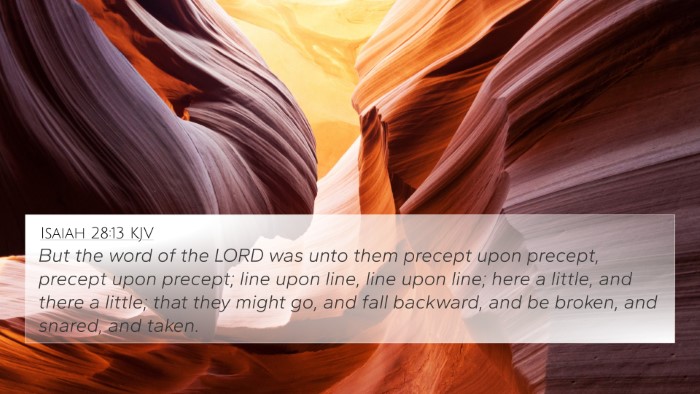Understanding Jeremiah 15:6
Verse: “You have forsaken me,” declares the Lord. “You keep going backward, so I will stretch out my hand against you and destroy you; I am tired of holding back.”
Summary of Meaning
Jeremiah 15:6 captures a profound moment of divine frustration with Israel's continued disobedience and turning away from God’s commands. The Lord expresses His deep disappointment that despite His guidance and mercy, the Israelites persist in their sinful ways. This verse emphasizes the seriousness of continued rebellion against God and highlights the consequence of divine judgment that follows when people refuse to heed His call.
Insights from Public Domain Commentaries
Matthew Henry
According to Matthew Henry, this verse reflects the divine lamentation over Israel's failure to recognize and return to a faithful relationship with God. He observes that “God stands with outstretched hands, ready to accept, but the people turn their backs” illustrating both God’s readiness to forgive and the people’s stubbornness. Henry notes that this verse serves as a warning against straying from God's paths, endangering one’s spiritual wellbeing.
Albert Barnes
Albert Barnes elaborates on the theme of forsaking God, suggesting that Jeremiah is expressing the inevitability of judgment when Israel persists in their sinful behaviors. Barnes mentions that God’s weariness suggests a limit to His patience, highlighting that the repeated violations by the people forebode serious repercussions. He emphasizes that the Lord’s reaction is not one of capricious anger, but rather a response to persistent disobedience and a call for the people to repent and return.
Adam Clarke
Adam Clarke interprets this verse as a significant moment where God conveys His feelings toward the unfaithfulness of His people. Clarke argues that the 'stretching out of the hand' symbolizes not merely judgment but a removal of divine protection. He reflects on the gravity of the situation, where the refusal to change paths leads to God’s decisive action against Israel's transgressions. Clarke's interpretation affirms the necessity of acknowledging God’s authority to avoid the ensuing destruction.
Bible Verse Cross-References
Jeremiah 15:6 can be cross-referenced with several biblical texts that resonate with its themes of rebellion, divine judgment, and the offer of redemption:
- Isaiah 1:4: “Ah, sinful nation, a people laden with iniquity...” — This verse highlights the sinful nature of Israel, echoing the sentiments in Jeremiah.
- Hosea 4:6: “My people are destroyed for lack of knowledge...” — Illustrates the consequences of rejecting knowledge and truth.
- Romans 1:28: “And even as they did not like to retain God in their knowledge, God gave them over to a reprobate mind...” — Connects the idea of forsaking God leading to divine withdrawal.
- 2 Chronicles 36:16: “But they mocked the messengers of God, despised His words...” — Reflects the behavior of those who reject divine input.
- Psalm 81:11-12: “But My people would not heed My voice, and Israel would have none of Me...” — Shows a historical pattern of disobedience.
- Ezekiel 18:30: “Repent, and turn from all your offenses...” — A call to repentance similar to what God desires from His people in Jeremiah.
- Galatians 6:7: “Do not be deceived: God is not mocked; for whatever a man sows, that he will also reap.” — Affirms the principle of divine justice as expressed in Jeremiah.
Thematic Bible Verse Connections
The themes manifested in Jeremiah 15:6 also find a home in various other verses throughout the Bible. These connections help to understand the broader narrative of divine patience, righteousness, and judgment:
- Proverbs 1:24-26: God calls out and extends His hands, but they refuse to respond.
- Matthew 23:37: A lament by Jesus over Jerusalem, akin to God’s anguish over Israel.
- James 4:8: “Draw near to God and He will draw near to you.” This emphasizes the reciprocal nature of relationship with God.
Understanding Cross-References in Bible Study
To enhance our comprehension of scripture, tools for Bible cross-referencing can be invaluable, helping to illuminate the connections between verses, themes, and teachings:
- Bible Concordance: A reference tool that lists words found in the Bible, allowing for the discovery of related verses.
- Bible Cross-Reference Guide: Explains how different scriptures are linked together.
- Cross-Reference Bible Study: A method of studying the Bible that emphasizes understanding verses in context with one another.
- Bible Reference Resources: Includes commentaries, dictionaries, and study guides to aid in deeper biblical understanding.
Conclusion
Jeremiah 15:6 stands as a poignant reflection of God’s relationship with His people throughout history. As indicated in the commentaries and through supported cross-referencing, it serves as both a warning and an encouragement to pursue a faithful relationship with God, warning against the dangers of forsaking Him. By engaging with the interconnectedness of biblical texts, believers can deepen their understanding and appreciation of God’s unyielding nature, His call to repentance, and the necessity of remaining steadfast in their faith.























